What is a Booktown? This South Wairarapa town is bouncing back one bookshop at a time
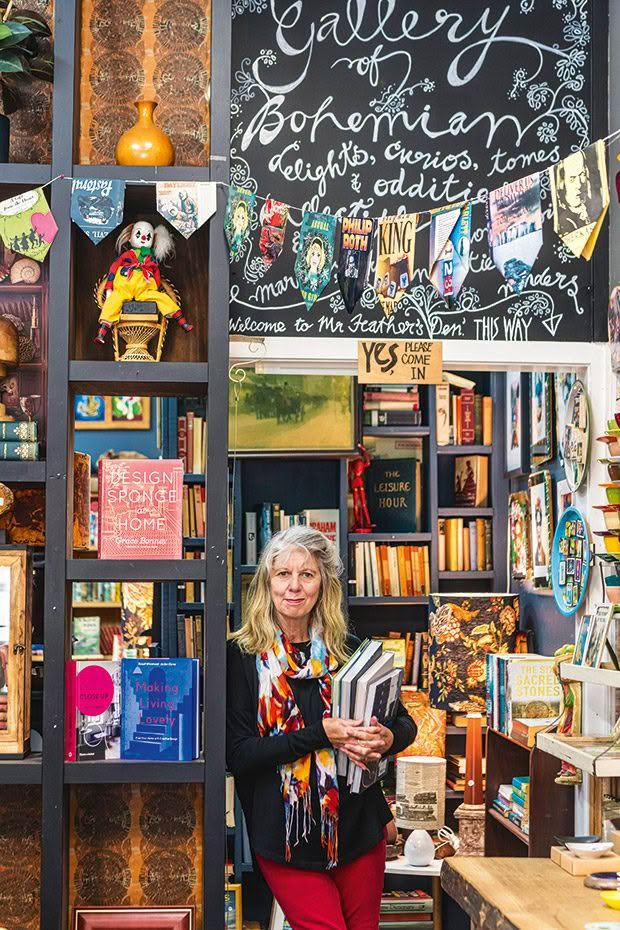
Sue Ryan offers gifts and homewares alongside secondhand and antiquarian books at Mr Feather’s Den.
How to save a small rural town from decades of gradual decline? A cadre of art-world book-loving heavy-hitters are making a difference in Featherston.
Words: Lee-Anne Duncan Photos: Mike Heydon
“The next chapter could start here,” reads a poster on Featherston’s main street. The words are faded, as the sign is from festivals past. But there’s nothing jaded about the event. The Featherston Booktown Karukatea Festival — now in its sixth year — is once again enthusiastically gearing up to attract writers, readers, illustrators, booksellers and book-lovers from throughout the country.
It brings prosperity to Featherston beyond the income of a single weekend. The festival’s operations manager Mary Biggs explains the aim of a Booktown: “A Booktown is generally set up in a small rural town, close to a major city. It’s often a town of scenic beauty and historic interest, or it’s had lots of shops and infrastructure in the past but has fallen on hard times.”
That surely describes Featherston. Its balconied buildings and canopied shopfronts are a shadow of its thriving past. The highway and railway, which segment the town, are reminders of Featherston’s importance as a connector of town and country. But since the rural downturn of the 1980s, the town has been less thriving and more surviving, with a large portion of residents commuting, returning only to sleep.
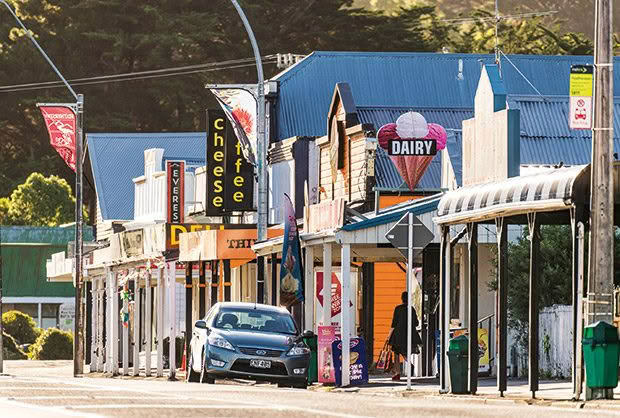
In 2021, more than 20 booksellers set up stalls in Featherston’s Anzac Hall, and the festival has given many local young schoolchildren a $15 book voucher to spend.
Over the past six years, Featherston has been fighting back — one bookshop at a time. In 2018, it became an official member of the International Organisation of Book Towns, in recognition of the character and prosperity its bookshops and book events have brought. “We wanted to make Featherston a Booktown to regenerate it, to give the people of the town their mojo back, to add a sense of pride,” says Mary.
That task couldn’t have fallen into better hands, for this town lucked into an illustrious list of book-loving residents. Mary herself is the founder of Lavender’s Green and a pioneer in artisanal food production, who also runs a cooking school using her cordon bleu credentials. Her husband, Peter Biggs (“Biggsy”) is a leader in the advertising and marketing industry, with a massive love of the arts. He’s also the CEO of the New Zealand Symphony Orchestra, having been a board member since 2014.
Lincoln Gould now runs a military history bookshop in Featherston but spent a decade as the CEO of Booksellers New Zealand, and before that, headed the Newspaper Publishers Association. Kate Mead, who owns Loco Books, had a long career as a presenter on RNZ Concert and is a professional cellist. All, of course, are enthusiastic readers.
Lincoln first floated the idea of becoming a Booktown, feeling it would benefit the town. After suggesting it to Mary, Biggsy, Kate and other locals, he visited the Clunes Booktown Festival in Victoria twice to see how it was done. On the second trip, Mary, Biggsy, Kate and her husband accompanied him.
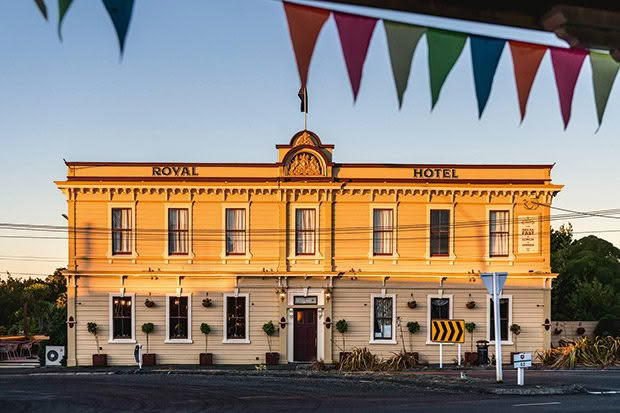
The Royal Hotel will be the location of many Booktown festival events in May 2021, especially its Joy Cowley Room, named in honour of the area’s local and prolific children’s writer.
Back in Featherston, they formed a charitable trust, with seed funding from the Biggses and others, and in 2015 the inaugural Booktown festival was held. According to Kate, who was the inaugural festival operations manager, it was a far less professional affair than it is today.
“We didn’t know if the concept would gain public support, whether it would be engaging enough to draw people. And at the time, e-readers were saturating the market, and the question du jour was, ‘Is the book dead?’ so it was clear we needed to start then.” The 2015 festival was small and a bit rough around the edges, she says, but it got started.
And it’s kept going. Each year, new events are added and the event draws thousands of people to the district to celebrate all things books: readers to shop, writers and illustrators to set up their desks full time in Featherston, including Vivienne Plumb, Emma Makes and Campbell Kneale, aka Cat Man. One of New Zealand’s most loved and prolific writers, Joy Cowley, already a resident, is the festival’s patron. A bespoke printer and a traditional letterpress printer have also established businesses in the town.
And, of course, bookshops have come. When the festival started, Featherston had two booksellers, For the Love of Books and Mr Feather’s Den. Neither Kate nor Lincoln had theirs — they both opened in 2016. Since then, the Featherston Ferret, the Dickensian, and most latterly, Chicken and Frog have opened, encouraged by the festival and the year-round book-browsing it attracts.
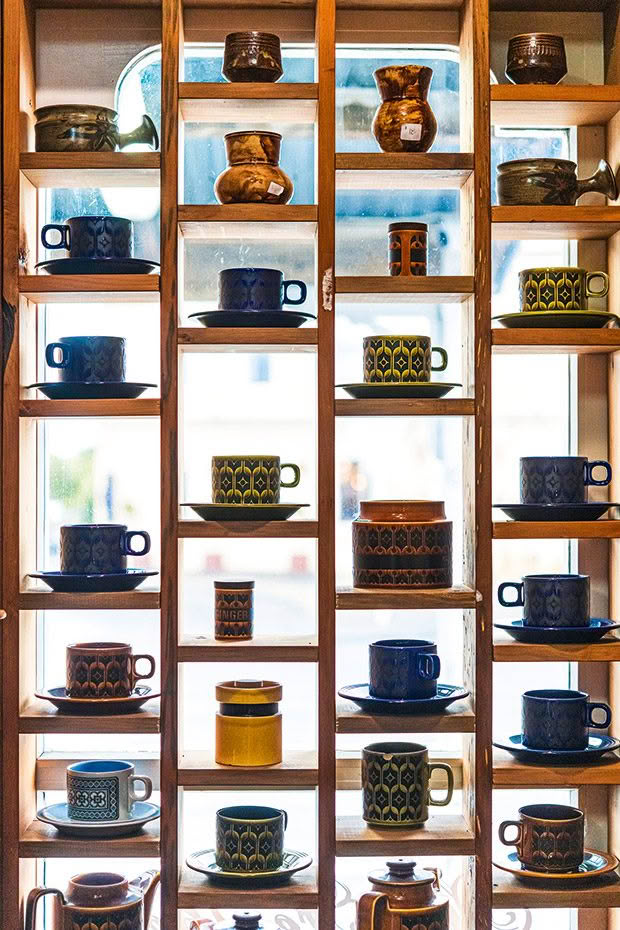
Tea cups for sale on display at Mr Feather’s Den.
“The festival has given Featherston a particular character that’s encouraging it to flourish,” says Kate. “We make up a golden triangle, with Greytown’s boutiques and Martinborough’s wine. We’re not standing on those towns’ toes but complementing them and making the three towns a real destination.”
It is fun to start at one end of the main street, wander down one side and back up the other, loading up on reading material along the way. Then, add a variety of cheeses from C’est Cheese, local history from the Fell Locomotive Museum, bread and pastries from The Baker, and a coffee at Everest Bistro before investigating the antiques and secondhand furniture.
“I think one of the key things that characterizes Featherston is fossicking,” says Mary. “Customers can come and mooch around, finding treasures and surprises. Being a Booktown has definitely helped.”
“It’s lovely that people are now coming to Featherston and enjoying it and telling us they enjoy it,” says Kate. “But it’s also lovely that the townspeople are again enjoying their own space. That’s so gratifying.” booktown.org.nz
Featherston’s Booktown bookshops
Featherston currently has seven bookshops. If one can’t produce a searched-for tome, its owners are more than happy to contact other bookshops, working together to keep customers coming back
LOCO COFFEE AND BOOKS
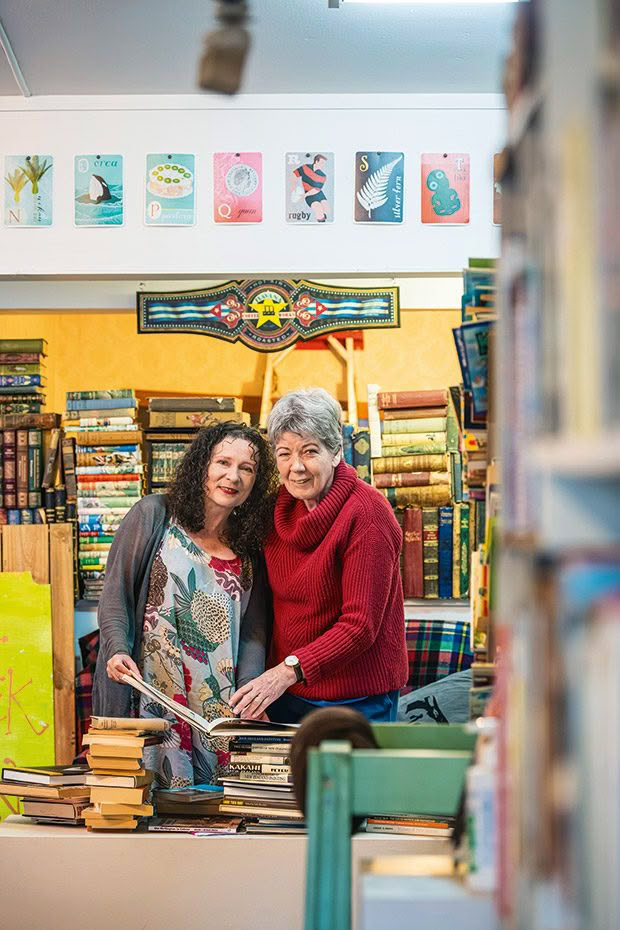
Kate Mead and Mary Biggs.
Ample time is a requirement when visiting Loco, because there are just so many places to sit and read, chat with locals, drink a coffee, and, very likely, get drawn to contribute to The Dominion Post quiz. That sense of connection is precisely what owner Kate Mead had in mind when she opened the doors in 2016, after giving up her job at RNZ Concert.
“I wanted Loco to be an eclectic mix of books that surprised and delighted people and made them want to keep looking further along the shelves.
“We’ve expanded the area from when we first opened, but it’s not a huge space, so I have to curate what’s in here.” Loco (the name is a hangover from the café that once occupied the premises, so don’t read too much into it) offers a wide range of books but leans towards New Zealand writers of all stripes. To make books accessible to all, Kate has a “free box” outside. “The books in the box are good but I might not have a place for them, or their condition might be a bit rundown.
“I put out the complete works of Shakespeare recently, and it was gone in a couple of hours. I have this dream that someone came along and thought, ‘I’ve always wanted the complete works of Shakespeare, but I could never afford it, and now I have one’.
‘I hope that whatever their stage of life or income, readers find something here they love.”
50D Fitzherbert Street. On Facebook.
MESSINES BOOKSHOP: MILITARY HISTORY
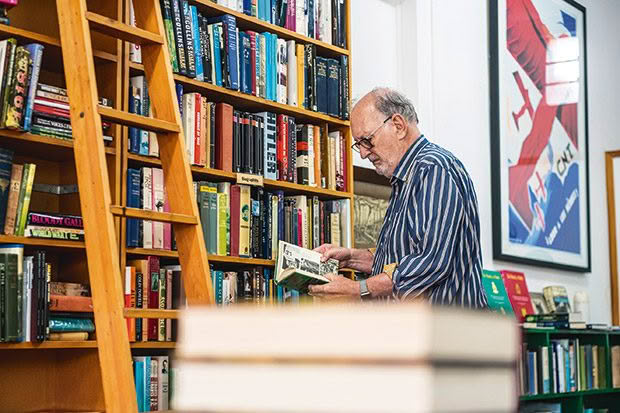
Lincoln Gould.
What does one do with a massive collection of military books? Open a military history bookshop. As the first chair of the Featherston Booktown Festival board of trustees and now serving as its “founding kaumātua”, Lincoln Gould’s Messines Bookshop further grew the town’s book stores in 2016.
It’s named Messines as the troops who trained in Featherston during World War One mostly were sent to the Western Front and first saw successful action at that West Flanders town. Also, the shop is across the road from the war memorial.
“Featherston is twinned with Messines and has a close relationship with it to this day,” says Lincoln, whose military knowledge would be difficult to best.
“I’m interested in history, and so much of history is to do with war. There’s a lot of interest from families now finding out more about what their granddads or great-granddads went through in the various wars but had never spoken about.”
Lincoln sells not only to local customers but others throughout New Zealand and overseas using his website, social media and an international books marketplace.
76 Fox Street, messinesbooks.co.nz
MR FEATHERS’ DEN
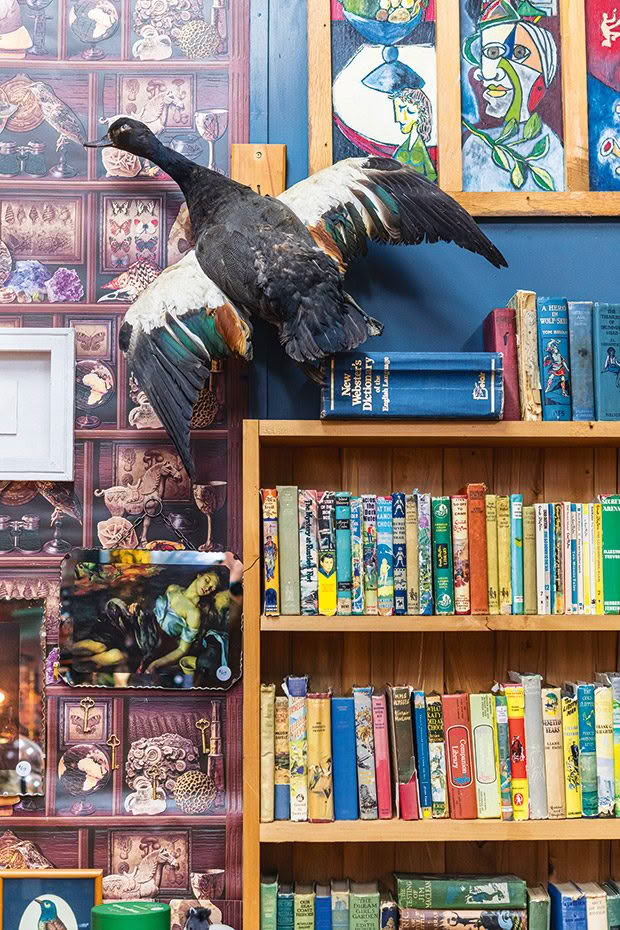
Mr Feather’s Den is more than a bookshop, it also offers a fine variety of gifts and homeware. “I guess I buy what I love,” says owner Sue Ryan.
Among the artisanal chocs and soaps and super cute taxidermy (no, really), she has carefully selected contemporary fiction and non-fiction, along with colourful, collectable hardbacks dating from the late 19th century to the first half of the 20th.
Similar to most booksellers, Sue is a huge reader. “I just love being surrounded by books,” she says. “But interiors are also a passion. Some days books are my bread and butter, and other days they’re not. It just depends.”
19 Fitzherbert Street. On Facebook.
FOR THE LOVE OF BOOKS
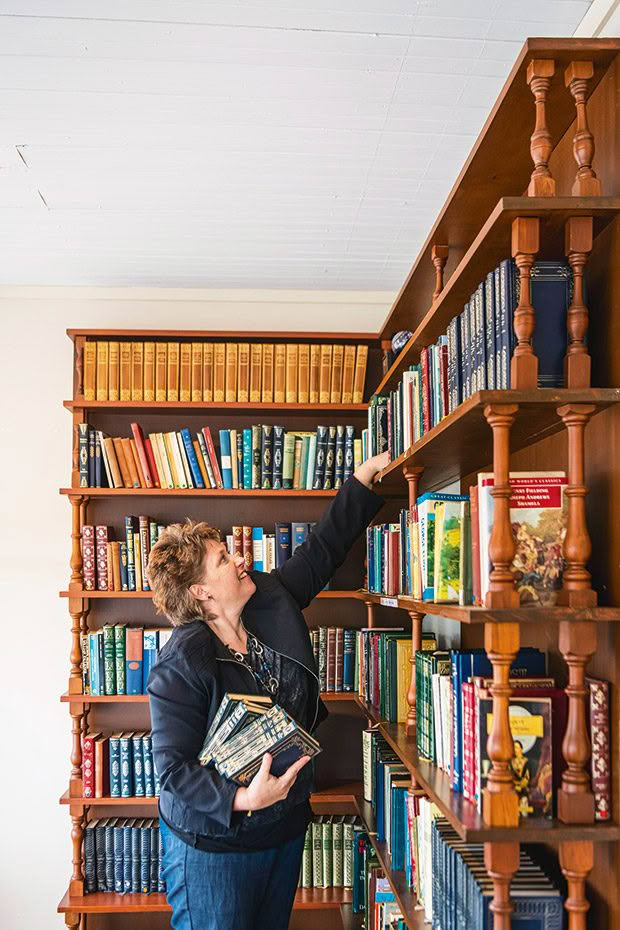
Jennifer Grey.
The biggest of the bookshops — and the first, although it’s swapped locations — Jennifer Grey estimates her shelves hold at least 50,000 books, usually secondhand. While most other shops have a more direct preference, there’s something for everyone in this shop, with the books neatly arranged into sections.
“I like organizing things,” says Jennifer. Despite the number of books, there’s plenty of room to move wheelchairs and buggies around without risking a title tsunami, something Jennifer is determined to preserve, no matter how many books she stacks.
89 Fitzherbert Street, welovebooks.nz
THE DICKENSIAN BOOKSHOP
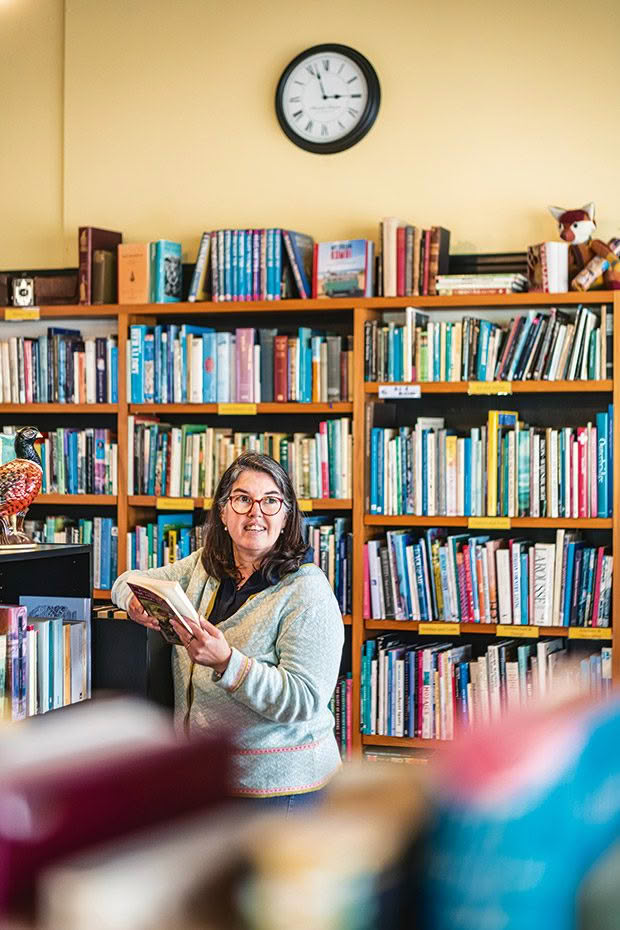
Patsy Adams.
As the name would suggest, the Dickensian Bookshop is focused on classic literature — including an impressive array of early-20th-century hardbacks that “fit nicely into a handbag”, says Patsy Adams, who owns the shop with her husband, Dave.
Having recently moved from a much smaller site in Featherston, they now have more room for their books, all in near-new nick, as well
as antique and collectors’ titles and New Zealand reference books.
The pair got into the business because they couldn’t bear to see books destroyed. “We were at a bookfair and asked what happens to the unbought books. ‘They go into a skip,’ we were told. Dave was heartbroken, so they said we could fill banana boxes with as many books as we liked for $5. So we did. When we learned Featherston was a Booktown, we wanted to be part of that, and opened up here.”
78 Fox Street, thedickensianbookshop.com
FEATHERSTON FERRET
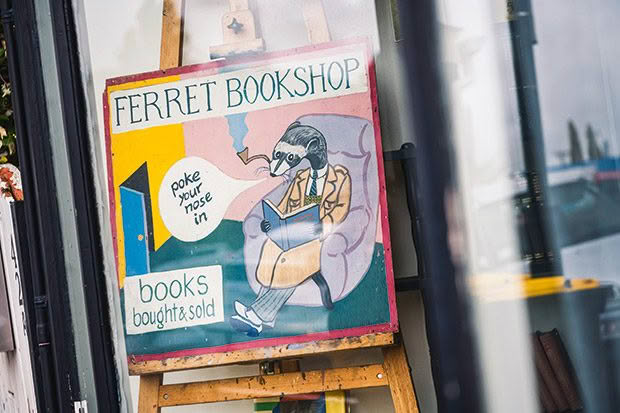
The smaller sibling of Wellington’s Cuba Street Ferret, the Featherston Ferret, makes one feel smarter merely by walking in. With a focus on “quality fiction and non-fiction, historical and contemporary, especially Aotearoa/New Zealand”, there’s the feeling every book is hand-selected.
Denise Eilers and her partner Terry Florian were part of discussions about setting up the festival and opened the Featherston Ferret after its inaugural success. “It’s been a highlight to see the culture of books and ‘bookies’ of all types celebrated over that weekend. Featherston Booktown itself is a work in progress, and it’s encouraging that its visibility as a focus for the depth of social and literary discourse is improving dramatically over time,” Denise says.
50 Fitzherbert Street, ferretbookshop.co.nz
CHICKEN AND FROG
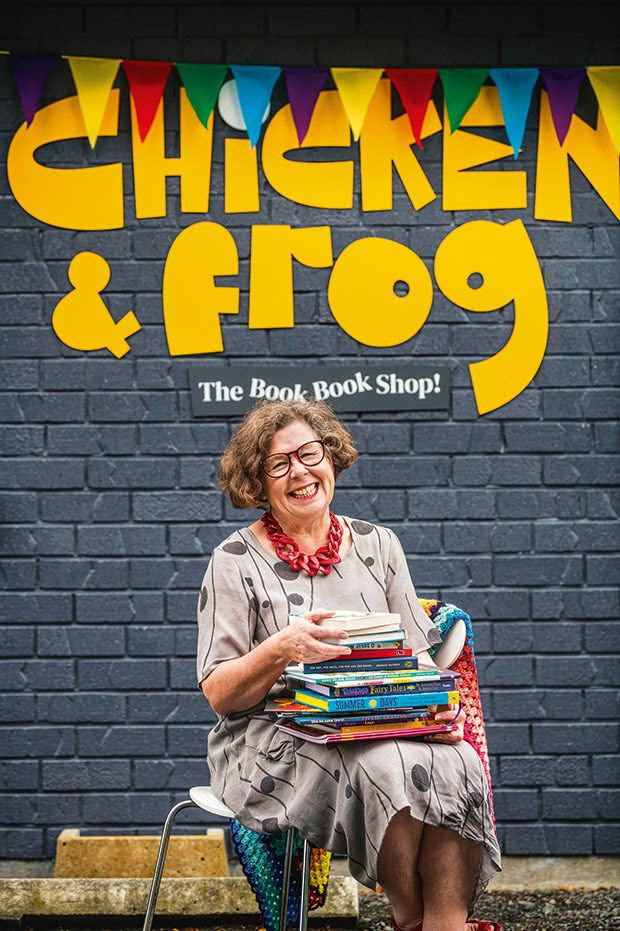
Joanne Ludbrook.
“Why the name? Because the chicken says ‘book, book’, and the frog says, ‘read it, read it’.” Of course. A recently retired school librarian, Joanne Ludbrook knows all the old jokes and what children love to read.
The newest bookshop on the block, Chicken and Frog, sells new children’s books, focusing on ages up to 14 or so, with a focus on non-fiction. Books are arranged in separate rooms — the building was a medical centre — and each has a theme, so it’s easy to find a tome that matches a particular preference. Space, perhaps, or Egyptians, cooking, nature or Matariki? Or dinosaurs? “I could sell a whole shop of dinosaur books, they’re so popular.”
Joanne loves to see children come in, settle down and read, or get involved with the displays that fire up their imaginations. There’s a permanent one of Joy Cowley’s work, of course, as the local literary heroine, but perhaps Joanne is proudest of her range of te reo Māori books.
Along with picture books initially written in te reo, many of the old favourites are translated. The Gruffalo, Dr Seuss books, Hairy Maclary, We’re Going on a Bear Hunt, even Whale Rider, along with dictionaries and non-fiction books. “They sell very well. We had two copies of Harry Potter in te reo, and they both went quickly. Daycare centres are driving te reo, and families want to keep up,” says Joanne.
“I think we can do better in getting kids excited about books. I love seeing parents and grandparents coming in and buying books for children. I love to imagine them going home, sitting down with those children, and sharing the book.”
3 Clifford Square. On Facebook.
Love this story? Subscribe now!
 This article first appeared in NZ Life & Leisure Magazine.
This article first appeared in NZ Life & Leisure Magazine.
